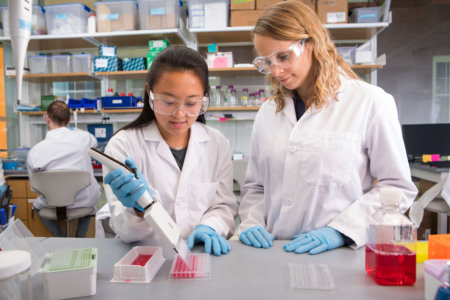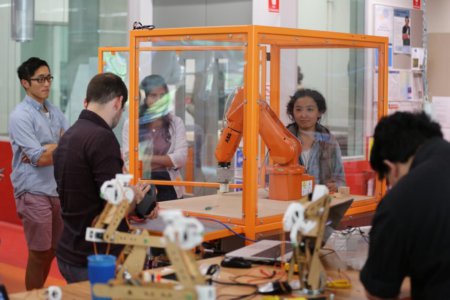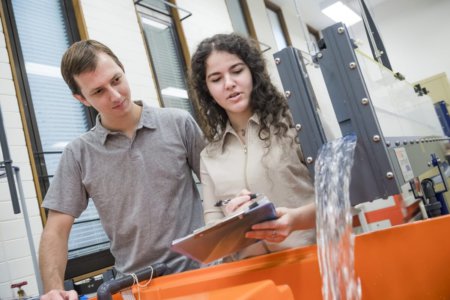
It’s never been a better time to pursue engineering. With every passing year, engineers continue to shape the landscape of technological advancement, producing cutting-edge research and inventions that make positive marks on the world. While much of this can be chalked up to hard work and innovative ideas, much of it is thanks to the skills engineers gain at world-class universities dedicated to providing the best that an education in engineering can offer.
Many of the top universities in engineering can be found in the US, which is one of the most forward-thinking countries in the world. Graduates from the country have gone on to achieve incredible feats, and that’s all due to the innovative and experiential learning opportunities most of these universities provide. Here are three universities you can consider if you want to pursue a degree in engineering.
University of the District of Columbia: School of Engineering and Applied Sciences
It’s no secret that degrees in engineering are highly sought-after, which naturally translates to top courses in the field charging exorbitant tuition fees. The University of the District of Columbia (UDC) bypasses this entirely. Outside of its reputation for academic excellence, it’s ranked one of the most affordable universities to pursue a bachelor’s in mechanical engineering in relation to average cost of attendance and student-to-faculty ratio.

Source: University of the District of Columbia: School of Engineering and Applied Sciences
That’s not to distract from the university’s top quality education in engineering. UDC’s School of Engineering and Applied Sciences (SEAS) ensures its students are actively exposed to current and relevant research, design and discovery projects that address challenging real-world problems from as early as their freshman year. Students are guaranteed to benefit from SEAS’s intimate classroom environment, opportunities for close collaboration with experienced faculty members, and room for mentoring.
Programs at SEAS are also accredited by the Accreditation Board for Engineering and Technology (ABET), which is an important benchmark for ensuring a collegiate programs has met the requirements needed to prepare graduates for jobs in critical STEM fields globally. SEAS in particular is one of four universities in the nation’s capital to provide ABET-accredited undergraduate degrees in engineering and computer science, as well as graduate degrees in selected areas.
This ultimately translates to students who are well-prepared for high-demand careers in engineering and computer science. Students have the opportunity to land internships and jobs through the school’s industry support programs with leading companies such as NASA, Apple, Amazon and Microsoft. With UDC, graduates are prepared to enter careers that will contribute to the betterment of their communities, countries, and society as a whole.
The school offers a range of undergraduate and postgraduate programs, including the Bachelor of Science in Biomedical Engineering, Civil Engineering, Electrical Engineering, Mechanical Engineering, Computer Science and Information Technology, plus new Bachelor of Science programmes in Computer Engineering and Cybersecurity, the latter of which is launching in Spring 2022. For more information, take a virtual tour of UDC, follow SEAS on YouTube, and UDC on Facebook, Twitter and YouTube.
The University of Texas at Arlington: College of Engineering
With 60 years of experience, the University of Texas at Arlington offers a comprehensive set of undergraduate and postgraduate programs in engineering. The university’s College of Engineering is the fourth-largest engineering school in the state and boasts a diverse student community, with students coming from 73 different countries. More than that, the college has a reputation for graduating students who enter the workforce with the capacities needed to make an impact on the global stage.

The College of Engineering at the University of Texas at Arlington is the fourth-largest engineering school in the state. / Source: UT Arlington College of Engineering (Facebook)
At UTA College of Engineering, students learn from a host of award-winning faculty members, most of whom are leaders in their fields. The Texas Tier One university actively encourages its undergraduate students to participate in research by supporting funded research experiences for undergraduates each year. Graduates from the college have gone on to become astronauts, start their own companies, develop popular video games, and lead major corporations.
The college offers a range of programmes across their faculties, including Bioengineering, Electrical Engineering, and Mechanical and Aerospace Engineering, among others. Students of its Bachelor of Science in Aerospace Engineering learn skills in aerodynamics, propulsion, and flight mechanics, among others. By the end of their curriculum, students are required to complete a vehicle design project. On top of this, students can also choose elective courses in a secondary field of interest, allowing for a more holistic and broadened scope of education.
The University of New Hampshire, College of Engineering and Physical Sciences
The University of New Hampshire is making waves as a leader in the engineering field. Its College of Engineering and Physical Sciences (CEPS) is top ranked for both research activity and sustainable leadership, all whilst being situated in one of the top 10 tech cities in the US. Alongside this, CEPS ensures its students are given access to world-class facilities. It’s home to the largest wind tunnel of its kind in the world, as well as an interoperability lab that’s one of the world’s leading test spaces for data and networking products — all of which are utilized by the world’s top organisations.

The University of New Hampshire’s College of Engineering and Physical Sciences is top ranked for both research activity and sustainable leadership / Source: UNH Engineering and Physical Sciences (Facebook)
At UNH, experiential learning is not only emphasised; it’s prioritised. CEPS encourages its students to pursue a number of research and design project activities through capstone learning experiences, where students can gain direct exposure to the industry. Its diverse community ensures that students are surrounded by a range of talented future pioneers, and its exciting study abroad programs provides students with the opportunity to gain unique and holistic learning experiences.
With UNH, students can choose from an array of bachelor’s, master’s and doctoral programs in engineering, mathematics, computer science, chemistry, earth science and physics. The land-, sea-, and space-grant institution offers interdisciplinary programs in materials science, environmental engineering and ocean engineering, as well.










